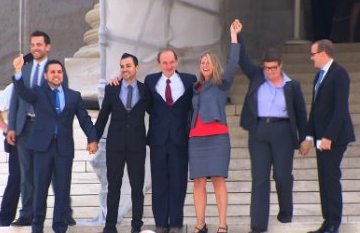 NEW YORK (CNNMoney) -- Many same-sex couples have been stranded in different countries by the federal Defense of Marriage Act. With the demise of DOMA, that is changing fast.
NEW YORK (CNNMoney) -- Many same-sex couples have been stranded in different countries by the federal Defense of Marriage Act. With the demise of DOMA, that is changing fast.
Just ask Judy Rickard of California and British citizen Karin Bogliolo.
They've been together for nearly 10 years and got legally married in the United States two years ago. But DOMA, which defined marriage as between a man and a woman, prevented Bogliolo from getting U.S. citizenship.
So Rickard, who is 65, and Bogliolo, 73, have been bouncing back and forth between California and the U.K. "Yo-yo people" and "love exiles" are how they describe their predicament.
And it has been costly.
In 2009, Rickard retired early at a reduced pension from her job at San Jose State University so she could spend six months a year in the U.K. -- the most allowed on a visitor's visa.
Leading separate lives also meant double expenses like rent and utilities, along with the flights back and forth to see each other.
The plane tickets cost around $1,000 apiece. Bogliolo was spending another $1,000 or so a month on a small apartment and utilities in the U.K.
"We've basically been running two households, and we were living like rich people. Rich people can go off and take trips abroad whenever they want, but we're not rich people," said Rickard. "I've had to dip into my retirement savings."
During their odyssey, Rickard and Bogliolo turned to the DOMA Project, which helped them file for a green card for Bogliolo. Those efforts went nowhere until the Supreme Court overturned DOMA in June.
Because the couple had already started the application process, Bogliolo's green card arrived soon after the ruling. She is now packing up her U.K. apartment and getting ready to move to California.
Advocacy group Immigration Equality estimates that there are 36,000 same-sex binational couples living in the United States, many of whom are married and stand to benefit from immigration benefits.
Most will have to wait four to nine months depending on where they live, said Kelly McCown, a San Francisco immigration attorney.
McCown said she has many clients who are looking forward to the emotional and financial relief from citizenship. And it's not just the couples living apart who have been spending thousands of dollars -- the ones who have managed to stay together have taken big financial hits too.
In one of her toughest cases, a Canadian woman has been draining her savings by paying thousands of dollars in travel and visa renewal costs to take care of her American wife, who is battling leukemia. But now they're able to apply for a green card.
She has worked with couples where the foreign spouse was unable to find a job and enrolled in graduate school just to get a student visa to remain in the country. Others have formed their own businesses so that the company could then hire the foreign spouse as an employee.
Australian citizen Anthony John Makk, 50, started a business in the United States so he could get a special visa and live with his American husband, Bradford Raymond Wells, who is 57.
Between visa and legal fees and more than 60 flights back and forth to Australia, the couple racked up well over $150,000 due to DOMA since they got married in 2004.
Like Rickard and Bogliolo, the couple applied for a green card before DOMA was overturned and expect to receive it any day now.
"When you really have to work to be together you appreciate it so much more, and we have worked so hard to stay together every day," said Wells.
Portland and Seattle
Free Subscription to Breaking News
Free Subscription to Breaking News






















































































































































































































































































































































